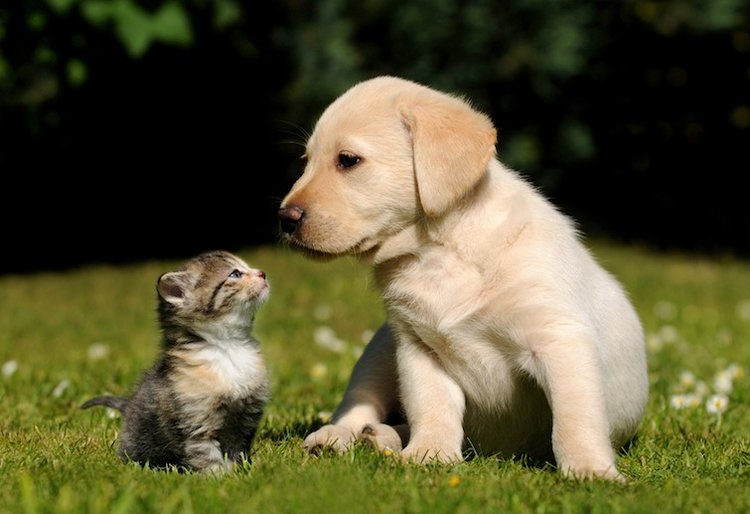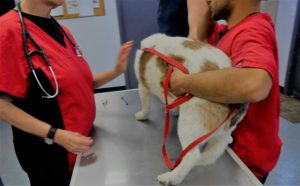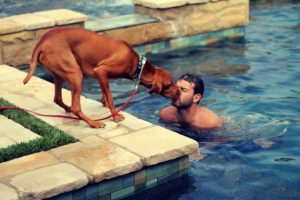Summer is the perfect time to head outdoors to enjoy the sunshine. Whether you’re planning to relax in the park, go to the beach, or take a hike, it’s a great opportunity for our four-legged friends to enjoy the warm weather themselves. However, the higher temperatures can pose some hazards to our pets’ health if we’re not careful. Taking the following precautions can help keep your animals in top form and considerably lessen the risk of them experiencing conditions like heat stroke and dehydration, which in some cases can prove fatal.
When in Doubt, Leave Them at Home
Dogs pant to lower their body temperature by constantly ventilating their system with environmental air. However, if that outside air isn’t much cooler than their body temperature, then they run the risk of developing heat stroke. If you foresee being outside in high temperatures for extended periods it can be a better choice to simply leave your pets at home and to keep their heat exposure limited.
Keep Them Hydrated
Your pets will need to drink much more water in hot weather, so ensure they’ll always have access to more water than they need. Use deeper water bowls, since they keep water cold much longer than more shallow containers. If it’s really hot, you can even add ice to help maintain the cold. If you’re going out with your dog, be sure to take a portable water bowl and plenty of water with you as well.
Exercise at the Right Times
If you’re going to walk your dog, don’t pick the height of the afternoon to see that they’re getting exercise. Temperatures and sunlight strength are much lower in the early morning or late at night and are a better time for dog walking, but you should still be on the lookout for symptoms of heat stress including:
- Excessive panting
- Glassy eyes
- Increased salivation
- Pale gums
Beware of Burnt Paws
Just as the pavement can become too hot for your bare feet, animals can also suffer from burnt paws when walking on hot surfaces for extended periods, especially ones like asphalt that absorb heat more severely. If you can’t carry your animal, you can purchase dog boots that will protect their paws from damage, or use topical products that create a protective temporary barrier on the surface of your animal’s paw.
Trim Their Coat, But Not All the Way
If you have a long-haired animal, trimming back their coat can help keep them cooler. However, always leave at least an inch, as some degree of length to their coat is vital for keeping them from getting sunburnt. For some animals, the coat actually provides a layer of insulation against the heat, in which case you can use specialized pet supplies to remove the thick undercoat while preserving the insulating outer coat.
Step up Flea Prevention
You should already have your cat or dog on a program of monthly flea preventatives to stop them picking up unwanted guests and keep them from making themselves at home in your household and breeding. Fleas tend to be more prevalent in the hotter seasons as well, so consult with your veterinary practice to stay on top of the problem.
Never Leave Animals Alone in Cars
No matter how convenient, don’t leave your dog in the car while out or running errands. It only takes ten minutes for the cabin of a car to reach 102° on an 85° day, and within half an hour this can get as high as 120°. Cars can overheat even with the tops of the windows 600 mg neurontin open, and parking in the shade is often ineffective as shade disappears on hot days with the movement of the sun. In some countries, leaving an animal alone in the car is even a criminal offense, so play it safe and take pets with you at all times.
Take Extra Care with Certain Breeds
Brachycephalic, or flat-faced dogs, can have less efficient respiratory systems than other breeds, and consequently, have a harder time staying cool in hot weather. Owners of such dogs should be extra careful not to over-exercise them and make sure exposure to heat and sunlight doesn’t overcome them. Flat-faced breeds can include:
- French and English Bulldogs
- Boxers
- Pugs
- Pekinese
- Shih tzus
- Boston terriers
- King Charles spaniels
Be Vigilant at Barbeques
Whilst your pet would lik
e nothing more than to wolf down a barbequed chicken wing, the food and drink on offer will often be highly unsuitable for health and cause them digestive problems, even in small amounts. Make sure you bring their own pet food along, and keep an eye out to make sure that other guests (particularly children) aren’t feeding the illicit treats, and ensure they’re not drinking guests’ unattended beverages.
Get Window Screens
Housepets, especially cats, like nothing more than to relax on a windowsill and watch the world go by. In the middle of hot weather, you’ve probably got some of your windows open, so it can be a good idea to keep screens on your windows that keep your home ventilated without risking the chance of a pet jumping or falling out of an open window.
Don’t Leave Pets Alone by the Pool
Not all dogs are naturally good at swimming or enjoy getting themselves wet. If you’re going on a boat make sure that your pet is equipped with a flotation device in case they fall in the water. If they do opt for a dip, make sure you rinse their coat off afterward with clean water to remove any salt or chlorine from his fur and try to ensure they don’t drink any chemical-laden pool water.
Be Vigilant Against Heatstroke
If your dog is too hot, leaving them in the shade to cool down with some water for a sufficient length of time is usually the only action you need to take. However, sustained heat stress can change to heatstroke faster than you think. Symptoms of heat stroke can include:
- Diarrhea
- Depression
- Vomiting
- Staggering
- Collapse
- Seizures
More severe heat stroke can even result in organ failure and eventually death. If you suspect your dog is suffering from heatstroke, take them out of the heat if you can, put some cold water or cool, wet cloths on their head, chest, paws and belly (don’t use ice cold water as it can exacerbate a state of shock) and seek veterinary advice as soon as possible.
Using common sense and following these guidelines can help both you and your pets safely enjoy the hot weather and long days together. If you have an animal that is very old, suffering from pre-existing health problems or overweight, go easy in high temperatures, and remember that animals, especially dogs, are unlikely to say ‘no’ and often let their enthusiasm overtake their physical endurance. Pay attention, stay hydrated, and, again, never ever leave an animal in an empty car.
About the author: Benetton William is a sportsman and freelance writer. Also, he loves web-design, around five months ago he has created his first website, check it out. William can’t live without traveling, pets, sweet coffee and self-improvement.












